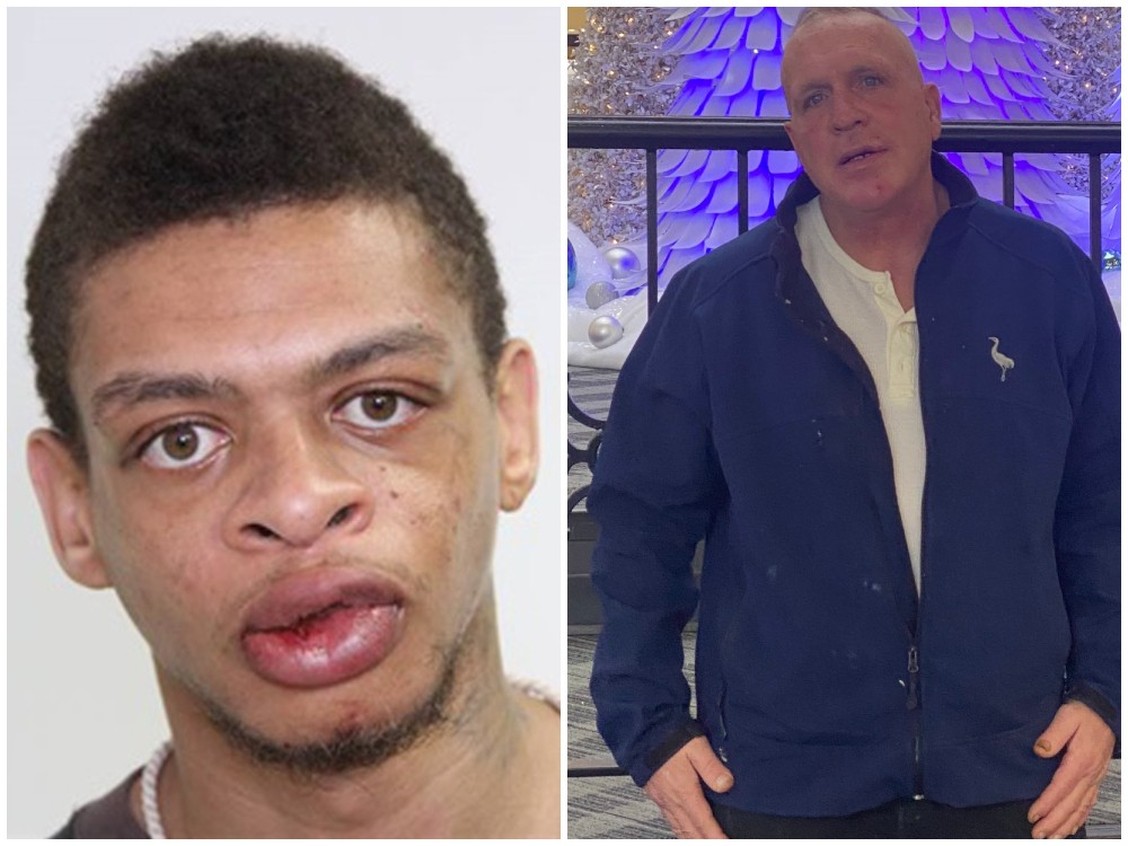Canadian Justice in Action (Inaction)
"When mental illness contributes to the commission of an offence, general deterrence will be a less important consideration because a mentally ill offender is not a suitable exemplar to dissuade other members of the public from similar conduct.""Understanding the root cause of his [Stanley Jago] criminality, and finding ways to address it, is in my view, the key to the long-term protection of society."Court of King's Bench Justice Anna Loparco"The Crown certainly takes no issue with the fact that Mr. Abbas's personal experiences as a Muslim Canadian would have undoubtedly played a role in him coming before the court today."Pre-sentence report"Mr. Woods recalls playing with cousins, picking berries and learning how to cut and jar fish."Provincial Court Judge R.P. Harris"She is haunted with nightmares; that going outside fills her with anxiety.""That her foundation of trust and empathy has been lost."Victim impact statement
 |
| Paul Knox, Michael Finlay's longtime friend, said Finlay's journalistic career, particularly his interest in reporting on Africa and his mentorship of new reporters, was shaped by his concern for the underdog. (Submitted by Lena Sadiwskyj) |
In
Canada's DEI, woke, Critical Race Theory pervasive social climate,
serious crimes at trial must be viewed through the lens of compassion
and woke justice where the crimes themselves and their perpetrators must
be handled differently than those of the aggregate society, if the
criminals' backgrounds, ethnic/cultural origins, familial situation,
state of personal security, mental health, place in society deem them to
be psychologically fragile. Psychopathic tendencies must be set aside,
as too the severity of their crimes to take second place to
consideration of their personal backgrounds.
Should
they fall into the categories of ethnic minorities, visible minorities,
poverty, mental instability, membership in colonialized groups, low
education level, struggling immigrant class, Indigenous or Black
heritage, special attention must be given to their poverty of
opportunity as opposed to the privileged white demographic who commit
unforgivable crimes for whom penalties are considered to be reflective
of their societal status, superior lifestyles and fulsome life
opportunities earning them the full impact of justice earned for
criminal behaviours.
Offenders
who fall into the socially deprived classification pay criminal
penalties judged to be commensurate not with the crime but with their
backgrounds of want and neediness, social and mental. A malefactor whose
unstable upbringing allied with dependence on drugs and/or alcohol
gives them the status of having been underprivileged, and thus must be
viewed through a different lens, one that is forgiving of his bad
fortune and in reaction, finds lesser penalties for capital crimes
appropriate.
Examples
of these special dispensations abound, but a few stand out for their
inappropriate society-harmful diminishing of injustice done to victims
of criminal violence. Anthony Woods, 27, stabbed 72-year-oldAlex
Gortmaker in the chest on an elevator, leaving him to bleed to death. He
was inebriated and high on drugs at the time. Four years on, he was
given what amounts to a free pass out of prison, spending eight months
in jail. The judge cited Woods' ADHD, unstable childhood and alcohol
dependence. Above all, that he was Indigenous.
Over
a 25 year period, 44-year-old Saeed Abbas racked up a criminal record
of 25 convictions; arson to car theft, and 22 breaches of parole. His
latest offences included breakins, fraud, and car thefts and stolen
wallets. He carried a loaded, illegal gun when caught breaking into a
Mercedes-Benz dealership. The Crown recommended a maximum sentence of
two years' imprisonment. The crimes, believed the judge and the Crown,
were to be considered not entirely his fault. Reason: He is of Arab
extraction, and his parents are Muslim; no positive expectations drawn
from that combination.
 |
At
a homeless shelter in Edmonton, Thomas Gignac disturbed the sleep of
another resident on his way back from the bathroom. Stanley Jago, in
reaction to his disturbed sleep, brutally attacked Thomas Gignac who
suffered a fatal seizure, as a result. At the time he killed Gignac,
Jago was on probation. Sentenced to five years in prison, taking
pretrial custody into account after the 2022 killing, he will be out of
prison in less than a year.
Of
Haitian descent, raised by an adoptive family, Jago merited a lighter
sentence in view of his severe mental health problems that, according to
the sentencing judge, reduced his "moral blameworthiness" for
the crimes he committed. While committed to excusing the homicide given
a condition of mental health problems, the judge spoke of her awareness
that he is likely not to submit to treatment to keep his mental illness
from further similar aggression against others.
In
2023, 73-year-old former CBC producer Michael Finlay, walking along
Danforth Avenue in Toronto was violently shoved to the ground. The
assault, unprovoked and by a stranger, caused a punctured lung, broken
ribs and led to medical problems that caused the man's death soon after
the assault. The serial offender convicted of the charge of manslaughter
was handed a sentence of three years. Robert Cropearedwolf, 43, earned
criminal convictions for violent crime from 1995 forward in both Canada
and the U.S.
 |
| Cropearedwolf, 45, pleaded guilty to manslaughter in connection with Finlay's death. (Toronto Police Service) |
Cropearedwolf
is Indigenous. His sentencing reflected his family history, including
his mother's substance abuse. In a victim impact statement, a friend of
Mr. Finlay's pointed out that:
"There are large numbers of Aboriginal people, Black people and people
of all sorts of backgrounds who have had very dreadful times and most of
them don't hurt people".
Labels: Aboriginal Forgivingness, Accountability, Exceptions in Justice, Sentencing Standards Corrupted, Violent Criminal Acts

<< Home